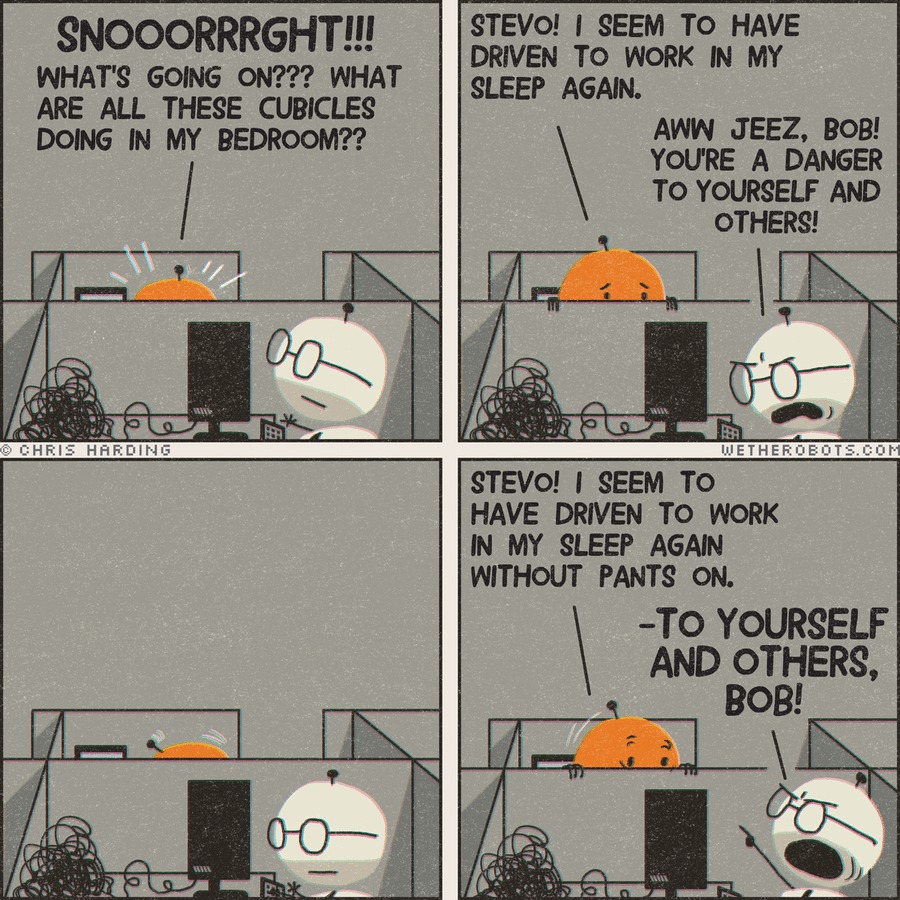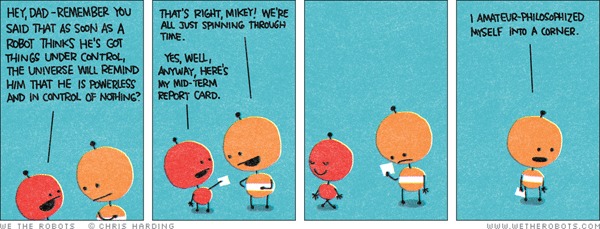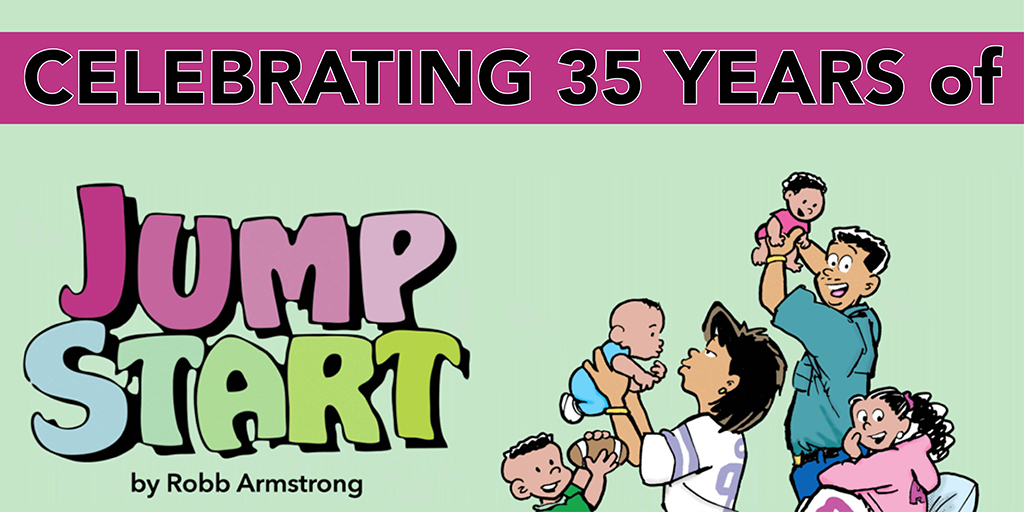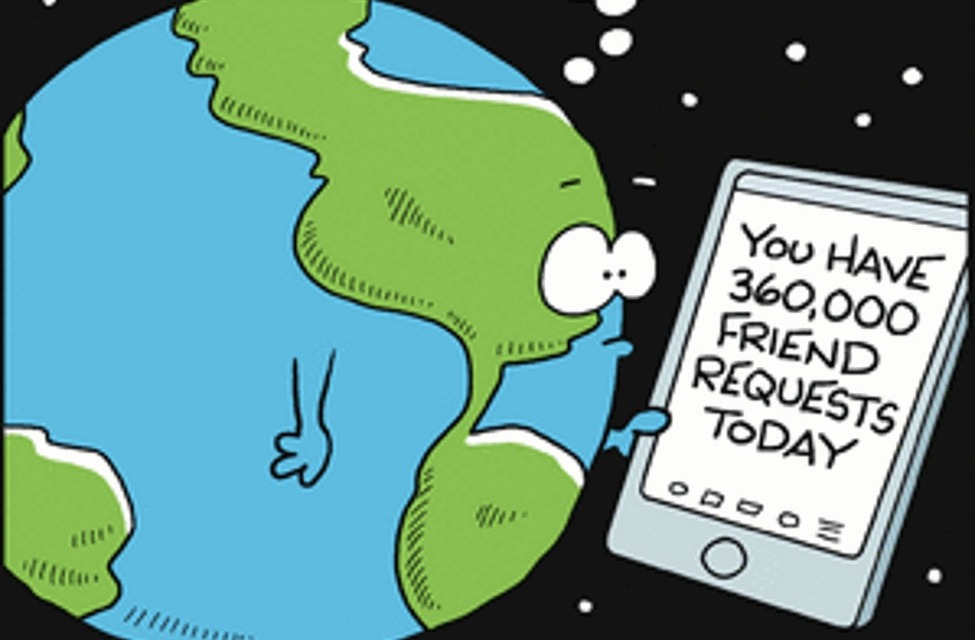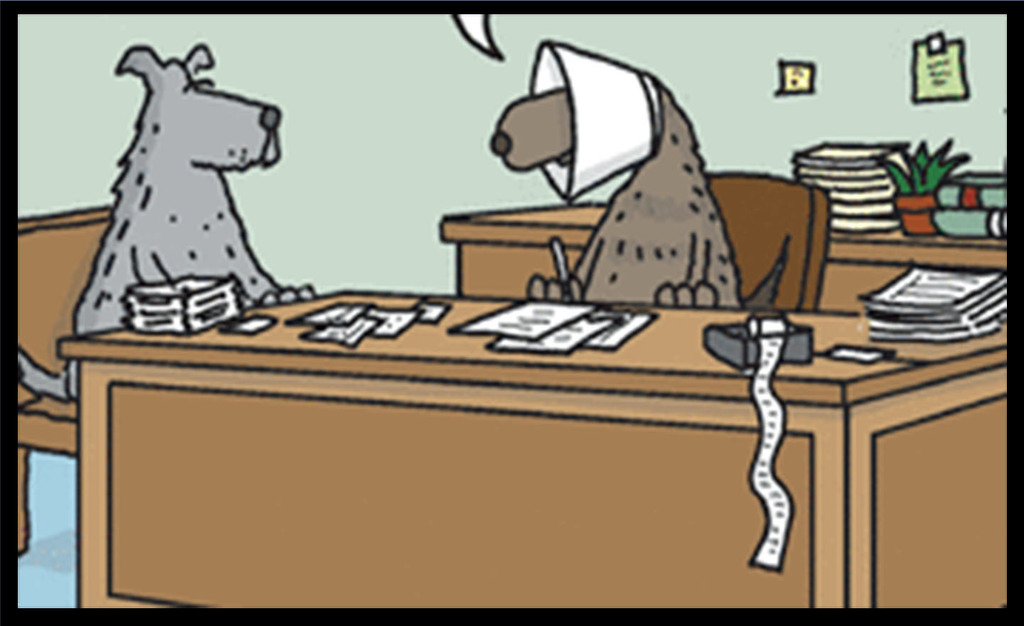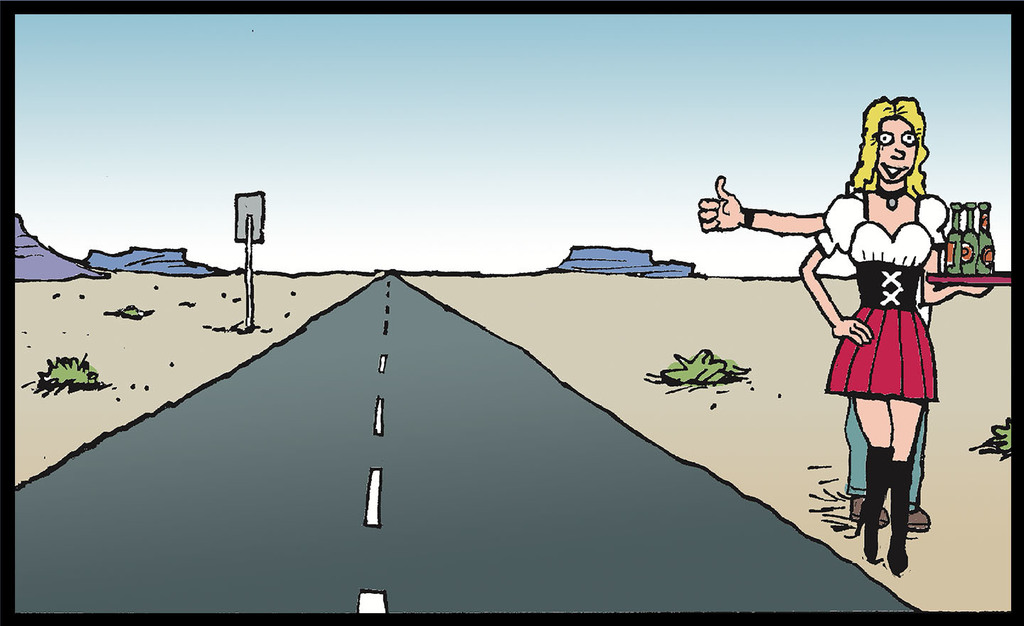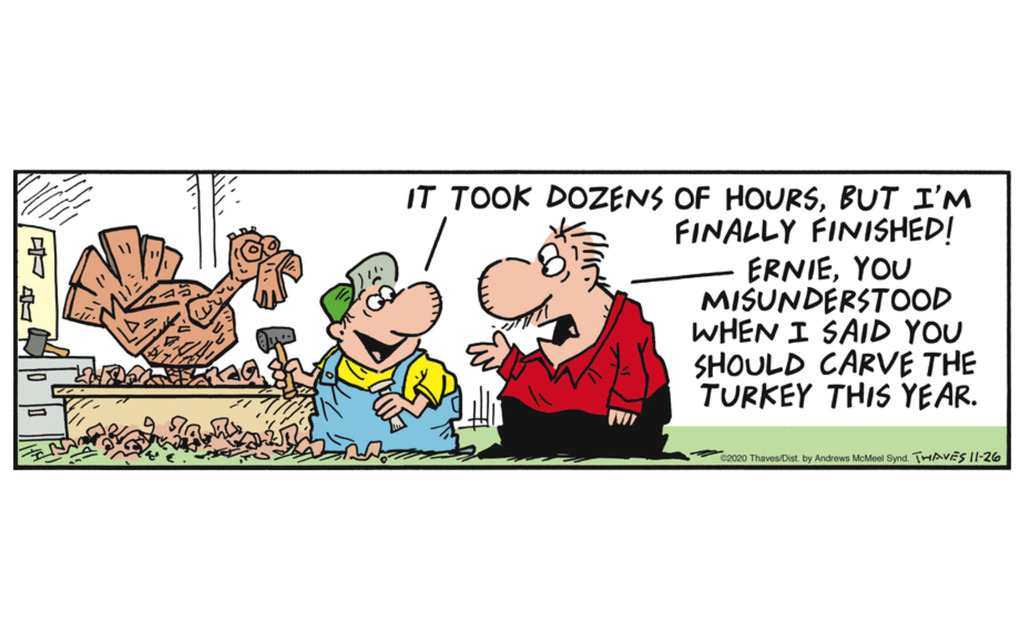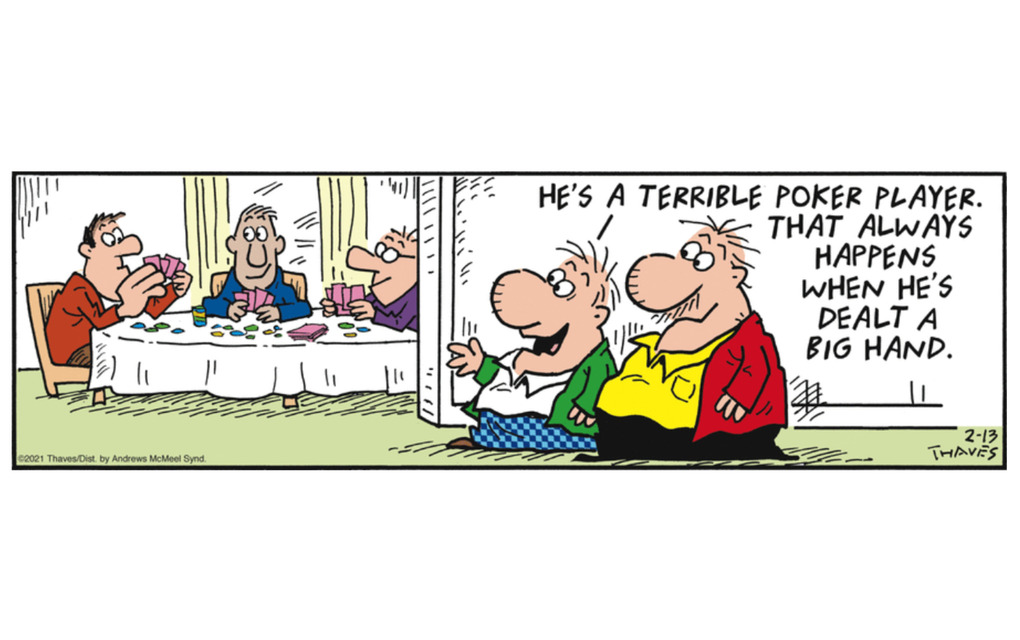Meet Your Creator: 'We The Robots' Artist Chris Harding
by Caleb GoellnerLast month, Chris Harding shook his We The Robots webcomic out of a seven-year long sleep mode session, reactivating it right here on GoComics. Despite the drudgery of Bob the Robot's existence, catching up on the strip has anything but laborious. Who knew one middle-aged robot's tormented career and family follies could be so entertaining? That's not a hypothetical question, either -- we knew exactly who: Chris Harding. We caught up with the animator/cartoonist/father of 30-40 for a look inside his creative process and passion for things sci-fi and sci-fa ("fa" is short for fact).
GoComics: What inspired you to create We The Robots and what's motivated you to keep it going?
Chris Harding: I don't know if "inspired" is the word. It's more like a sometimes compulsive urge. Like pooping. It’s a lot of fun to make up a world where you can complain and ask questions and you have complete control. Back in college a cartoonist friend of mine said, "If the world were the way we wanted it to be, we wouldn’t have to creep off and create our own." And that’s pretty much it. Escape. Fantasy.
GC: WTR has a simple-but-stylized aesthetic with warm colors and soft textures. On social media, you've joked that your process is painting a circle and then drawing on top of it with a black pen. How did you decide on and develop your style?
CH: The first thought was that I have to be able to draw it fast. I have a job and an old house and like 30 daughters, so I can't be spending all day making up fancy pictures. So I tried to design something pretty simple. But even without that, I would still really favor the idea of stripping characters down to a point where all that's left is an expression or a gesture. It's the best thing about cartoons. The pictures can almost be read like symbols for the reader's own familiar emotions. So simpler is better, as far as I’m concerned. Then I added in a bunch of digital fakery to give it a little texture and softness.
GC: After drawing WTR for about two years from 2007-2009, you took a break until July of 2016. What made you want to return to regularly working on the strip?
CH: Yeah, that was a much longer break than I had expected. I hate to think of it. At the time I put it on pause, I had just an incredible amount of stuff going on that made it impossible to focus on a comic. Among other things, our third daughter had just been born and I had also just taken on a very taxing day job. I tried to carve out some time to work on a few other projects here and there. Starting back up, I was partly inspired by my friend Brian Gordon who had been doing wonderful things with his comic Fowl Language. I didn't want him to have all the fun.
GC: On top of WTR, you also work in animation and more. How does one gig inform the other, and do you find it's helpful to work in multiple disciplines?
CH: I like working in a few different media. I like comics because they're relatively quick to produce, although they require a long-term dedication to really add up to much. Animation is a beautiful art form that I wish I had more time to work in. I often think of the comic ideas as if they are moving and with sound, and then it’s like I’m translating them into a print form. Dabbling in both has been helpful for sure. Animating has helped me pare down the look of things. All the writing and implied timing in comic strips helps with making animation decisions. I enjoy being able to work back and forth between the two. I have a daughter who is very into learning to animate, and it kind of makes me want to do more of it again too.
We the Robots by Chris Harding December 16, 2016
GC: We The Robots often casts robots in everyday situations, but there are times when it directly references the characters' mechanical nature for gags. How do you strike a balance between your strip's literal premise and the need to connect with organic beings?
CH: In my mind, they are robots the same way Bugs Bunny is a rabbit-- which is to say, only as far as the character's embodiment serves a story about human life.
For example, one aspect of Bugs Bunny is that he is a prey animal, and that sets a lot of his stories in motion. He minds his business until someone comes along and starts some shit with him, then he behaves like any human comic hero. But his rabbit-ness is always there to be drawn upon when it's funny or helps the story.
The robots are machines which presumably have specific, purposeful programs to carry out. But maybe, like all software, it doesn't work perfectly in the real world. I like playing off that, at least under the surface. It frames human life in a certain way. Our programming doesn’t work all that well either.
At the same time, sometimes it's fun to just play off some function of a robot's physical body for a gag.
GC: Outside of your own comics, do you have any favorite robots?
CH: Is HAL9000 a robot? He's a sentient electronic thing anyway... Bladerunner is always a favorite... Ex Machina was a fantastic movie... I enjoyed the Asimov robot books… And of course the Kraftwerk song. (Which, for the record, is not the basis for the name of the comic. That came from our constitutional preamble.)
Soon I expect we'll be dealing with actual robots and sentient things. Which is pretty dangerous if we don't handle it with caution and maturity. So naturally we are all doomed.
GC: Be real. Is HBO's new Westworld a prequel to We The Robots?
CH: Ha! Actually, I always thought the robots had come from some kind of alternative silicon-based evolutionary process, not necessarily guided by anyone. But what do I know? Maybe there is a creator. Maybe this is the most boring theme park ever devised. Drudgery World.
We the Robots by Chris Harding March 24, 2009
GC: What are some of your favorite comics right now (strips, comic books, OGNs)?
CH: Oh, I’ve been really digging Sarah Anderson’s work, as well as my friend Brian Gordon. I used to love Cul De Sac by Richard Thompson. There’s a German (I think?) cartoonist, and I don’t even know her name. She has an indecipherable url, and she’s worth checking out at http://floccinaucinihilipilificationa.tumblr.com/
There are a bunch of very good things happening on the web. Lots of infuriatingly young people doing beautiful work. But other than a few web things here and there, I don’t actually read a lot of comics. I mostly read non-fiction books for some reason. Books about scienc-y stuff.
GC: It takes a lot of discipline to create a comic on a regular schedule, particularly when you have other work, a family and other concerns. How do you stay motivated and maintain your work ethic?
CH: It's tricky! Did I mention my 40 daughters? I've had a tendency to burn out sometimes, so I try to keep this as light as possible. It’s helpful that there’s a bit more of a community for webcomics than there was in the newspaper days. (I’m very old).
